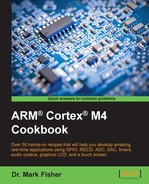To further illustrate how to use the features of CMSIS-RTOS that we've introduced in this chapter, we'll return to the Pong program that we first introduced in Chapter 2, C Language Programming. We'll call this recipe: RTOS_Pong_v8v0. Due to space limitations, we're only showing those parts of the code that are relevant to the RTOS implementation. Refer to Chapter 2, C Language Programming for details of helper functions defined in the pong_utils.c file.
To create a multithreaded pong game, follow the steps given:
- Create a new project (new folder) called
RTOS_Pong. Set the RTE to include board support for the ADC and GLCD. Include CMSIS-RTOS. - Create a file named
RTOS_Pong.cand add a task to handle the GLCD:void taskGLCD (void const *argument) { BallInfo init_pstn = thisGame.ball; for (;;) { osEvent evt = osMailGet(mail_box, osWaitForever); if (evt.status == osEventMail) { mail_t *mail = (mail_t*)evt.value.p; thisGame.p1.y = mail->pdl; osMailFree(mail_box, mail); osMutexWait(mut_GLCD, osWaitForever); update_player(); if (thisGame.ball.x<BAR_W) { /* reset pstn */ osDelay(T_LONG); erase_ball(); thisGame.ball = init_pstn; } draw_ball(); osMutexRelease(mut_GLCD); osDelay(T_SHORT); osSignalSet(tid_taskBall, 0x0001); } } } - Add a task to update the ball and check for collisions:
void taskBall (void const *argument) { for (;;) { osSignalWait(0x0001, osWaitForever); update_ball(); check_collision(); osSignalSet(tid_taskGLCD, 0x0001); } } - Add a task to handle the ADC:
void taskADC (void const *argument) { uint32_t adcValue; for (;;) { mail_t *mail = (mail_t*)osMailAlloc(mail_box, osWaitForever); ADC_StartConversion(); adcValue = ADC_GetValue (); mail->pdl = (adcValue >> 4) * (HEIGHT-BAR_H)/256; osMailPut(mail_box, mail); osDelay(T_SHORT); } } - Add
main(), saveRTOS_Pong.c, and add the file to the project:int main (void) { HAL_Init ( ); SystemClock_Config ( ); game_Initialize(); ADC_Initialize(); GLCD_Initialize (); GLCD_Clear (White); /* Clear the GLCD */ GLCD_SetBackColor (White); /* Set the Back Color */ GLCD_SetTextColor (Blue); /* Set the Text Color */ mail_box = osMailCreate(osMailQ(mail_box), NULL); mut_GLCD = osMutexCreate(osMutex(mut_GLCD)); tid_taskGLCD = osThreadCreate(osThread(taskGLCD), NULL); tid_taskBall = osThreadCreate(osThread(taskBall), NULL); tid_taskADC = osThreadCreate(osThread(taskADC), NULL); osDelay(osWaitForever); while(1) ; } - Create an appropriate header file named
RTOS_Pong.h:#ifndef _RTOS_PONG_H #define _RTOS_PONG_H #include "cmsis_os.h" #define __FI 1 /* Font index 16x24 */ /* Mailbox */ typedef struct { uint32_t pdl; /* paddle position */ } mail_t; osMailQDef(mail_box, 1, mail_t); osMailQId mail_box; /* Mutex */ osMutexDef(mut_GLCD); osMutexId mut_GLCD; /* Mutex to control GLCD access */ /* Function Prototypes for Tasks */ void taskGLCD (void const *argument); void taskBall (void const *argument); void taskADC (void const *argument); /* Declare Task IDs */ osThreadId tid_taskGLCD; /* id of thread: taskGLCD */ osThreadId tid_taskBall; /* id of thread: taskGreq */ osThreadId tid_taskADC; /* id of thread: taskMotor */ /* Define Threads */ osThreadDef(taskGLCD, osPriorityNormal, __FI, 0); osThreadDef(taskBall, osPriorityNormal, __FI, 0); osThreadDef(taskADC, osPriorityNormal, __FI, 0); #endif /* _RTOS_PONG_H */ - Copy the
pong_utils.candpong_utils.hfiles (refer to Chapter 2, C Language Programming.) and add these to the project. - Build, download, and run the program.
The tasks named taskGLCD( ) and taskBall( ) are synchronized using a flag so the ball position is updated every time the screen is refreshed. The task named taskADC( ) sends the position of the paddle to a mailbox; taskGLCD( ) receives this value and uses it to render the paddle. The tasks are illustrated in the following diagram:

The tasks are loosely coupled and can be independently tested. For example, during debuging, the taskADC( ) function and statements within taskGLCD( ), which read the mailbox and render the paddle, can be "commented out," leaving a simpler program that just moves the ball around the screen. The mailbox has only one slot. This is a key design decision that ensures that the paddle is rendered each time the ADC is read, so everything is synchronized to taskADC().
